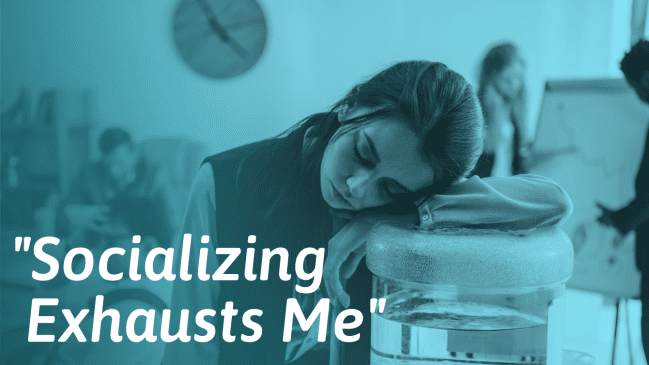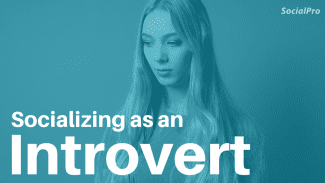It’s so demanding to be social. I want to make friends and have meaningful relationships, but it’s draining. Is something wrong with me? How do I work on this? – Taylor.
As humans, we’re wired for social connections and relationships. That said, at times, it may feel exhausting to socialize. If this is the case for you, it’s important to understand the main reasons contributing to this feeling. Let’s get into the key factors.
Introverts tend to get exhausted from socializing
Introversion refers to a personality style defined by preferring the inner life within yourself or a few, select people instead of the outer life shared with many people. Introverts often prefer to work alone, and excess social interaction can feel draining.
In contrast, extroverts prefer being around other people. They like working in groups. Additionally, they make friends quickly, enjoy sharing ideas, and derive energy from social interactions.[1]
You might be an introvert if you:
- Genuinely enjoy solitude.
- Feel exhausted after socializing with too many people.
- Quickly lose energy in social settings.
- Prefer spending time with a small group of close friends.
- Get overstimulated or distracted in social environments.
- Enjoy learning by watching other people first.
- Gravitate towards jobs or activities that are more independent.
- Enjoy intimate conversations rather than large gatherings or small talk.
- Attend mandatory events, but skip out on optional ones.
Although many people confuse introversion with shyness, they are not the same. Some introverts may be shy, but that’s not always the case. Many introverts have no problem talking or feeling confident with others- they just tend to be more introspective, reserved, and quiet.
The well-known “Big Five”-test helps evaluate whether you identify more as an introvert or extrovert. You can do a short verion of the test for free on the Open-source Psychometrics Project.
We live in a world that tends to embrace extroversion. That said, personality types are generally stable over time, and there isn’t anything wrong with being an introvert. Introverts are often good listeners, independent thinkers, and creative in their work.
To make the most out of being an introvert, consider the following tips:
Give yourself time limits
Before attending an event, determine how long you want to stay there. Knowing that you have an exit strategy and a defined plan for leaving can help you embrace the experience.
Plan something enjoyable to do for yourself right after the event
Introverts often need time to recharge alone after socialization. Make a plan to engage in something positive like taking a walk, reading a book, or showering.
Initiate plans to spend time with just one other person
Socialization is still important, even if it exhausts you. The key is finding socialization that satisfies your intrinsic needs for connection and support. Instead of forcing yourself to attend parties or large gatherings, consider asking a friend if they’d like to meet up for coffee or grab lunch.
Don’t try to meet others expectations of how you should be
Do you feel expectations on you to be high-energy, chatty, or any other way that’s not “you”, when socializing? Try allowing yourself to stay at a social energy level you feel comfortable with.
Be friendly, make small talk, be a good listener. But don’t go into a role that consumes energy. This can help you enjoy socializing more. If someone says “You’re quiet today”, you can just respond “I’m feeling relaxed today”.
Main article: How to be more social as an introvert
Social anxiety can make social interaction tiring
Social anxiety can make you feel drained after interactions with others. That’s because anxiety can be so distracting and consuming. Rather than being able to enjoy the experience, you might spend most of your time analyzing your behavior or what other people think of you.
After the socialization, you might spend excess time judging yourself for what you did (or didn’t say). These mental gymnastics can be tiring!
Social anxiety is treatable, but it requires work and self-discipline. Check out our guide on the best social anxiety books. To improve in this area, consider the following:
Identify your fears
What scares you the most about social interactions? Are you afraid of rejection? Being judged? Being laughed at and dismissed altogether? By pinpointing your fear, you can create goals to work on that issue directly.
Practice routine social exposure
It’s important to give yourself ample opportunity to be in the world- even if it feels frightening. The Conversation discusses how to engage in gradual exposure to become more desensitized to your fears.
Eliminate ‘absolute’ thinking
People with anxiety often struggle with extreme styles of thinking. For example, you may assume everyone is judging you. You may also assume you do nothing right. Force yourself to challenge these thoughts as they arise. For instance, instead of thinking everyone is judging you, can you reframe to, even if some people are judging me, most people are probably focused on themselves.
Affirm yourself after taking social risks
If you criticize yourself, you tend to perpetuate feelings of guilt and shame. These feelings then may make you feel even more anxious during the next interaction. No matter the outcome, you need to be on your own team. Get in the habit of validating yourself with realistic compliments like, I am proud of myself for taking this risk, or I am glad I am willing to keep growing and learning.
Read more on how to make friends when you have social anxiety and how to not get nervous talking to someone.
Exhaustion can be a sign of depression
Exhaustion is a common symptom associated with depression. If you are depressed, you may feel tired- no matter the situation. That said, low self-esteem, problems with concentration, and guilt are also part of depression. As you can see, this makes socialization even more challenging.
Depression can skew your worldview. For instance, you might assume that people don’t like you. If they do like you, you might question why.[2]
If you’re struggling with depression and find it exhausting to socialize, consider these tips:
Take care of your physical health
Your physical health and emotional well-being go hand-in-hand. If you neglect taking care of yourself, you may feel more fatigued than usual. If you struggle with depression, eating well, and exercising regularly can be challenging. Commit to focusing on one small habit each week. For example, you might decide to exercise for 15 minutes each day. Or, you may decide to cut out drinking soda.
Find an accountability partner
It can be helpful knowing you have at least one person in your corner. This person can be anyone – a friend, family member, partner, or even a therapist. Ask your accountability partner to check in on you when you’re struggling.
Consider professional treatment
Depression occurs due to chemical imbalances in the brain. Therapy, antidepressant medication, or a combination of both can help stabilize your overall mood. To start the process, discuss your options with your primary care physician. You can also look for therapists or psychiatrists in your local area who specialize in depression.
We recommend BetterHelp for online therapy, since they offer unlimited messaging and a weekly session, and are cheaper than going to a therapist's office.
Their plans start at $64 per week. If you use this link, you get 20% off your first month at BetterHelp + a $50 coupon valid for any SocialSelf course: Click here to learn more about BetterHelp.
(To receive your $50 SocialSelf coupon, sign up with our link. Then, email BetterHelp’s order confirmation to us to receive your personal code. You can use this code for any of our courses.)
Here’s a guide from the US National Institute of Mental Health with more information about what to do.
Toxic friends can drain your energy
The quality of socialization matters far more than the quantity of socialization. This means that if you’re spending time with toxic people, you may feel drained or resentful after the interactions.
How do you know if a friend might be toxic? Consider the following warning signs:
- They put you down consistently – even if they tell you they’re just joking.
- They gossip about others (which means they may gossip about you as well).
- They become harsh or critical when they don’t approve of your decisions.
- They seem to get jealous of your successes.
- They don’t respect your values.
- They try to change you into someone you’re not.
- They run to you when they have a problem, but when you need them, they are flaky or unresponsive.
- They “take” a lot from you- whether it’s your time or money.
- They don’t honor your boundaries.
Toxic friendships can make you feel even lonelier. They also tend to make you feel more stressed and insecure. These factors can all contribute to feeling more exhausted after socialization.
If you’ve identified that you have a negative or disrespectful friend, consider the following:
Write down the pros and cons of the friendship
This can be an uncomfortable, eye-opening activity. Do you have an equal number of pros and cons? Or, do you notice a disproportionate amount of cons? How do you feel looking at the list? Does it inspire you to keep working on the relationship? Or, does it make you aware that there are some glaring problems that you need to address.
Consider what the relationship is worth to you
Imagine how you might feel if this person and you were no longer friends. There might be an initial sense of sadness or guilt, but what other emotions might you experience? Happiness? Relief? Pay attention to these emotions – they are telling you something.
Expand your social circle
The more people you meet and interact with, the easier it is to let go of friends that exhaust you. Here’s our guide on how to be more social.
Taking care of other people’s problems
Do you take on everyone else’s problems? Does everyone call you their token therapist because you’re such a great listener?
At times, we all take care of the people we love, but if caretaking is your primary identity, you risk burning out entirely. Caretakers often:
- Feel an excessive need to help others.
- Jump in to provide support and guidance (whether or not they are asked to do so).
- Struggle with setting boundaries.
- Feel a sense of guilt or selfishness if they aren’t always “on” for other people.
- Withhold their own feelings because they don’t deem them as important as other people’s struggles.
- Work in helping professions where they take care of patients, clients, or customers.
- Feel validated by how much they help others.
- Struggle to be vulnerable with their own needs.
Caretaking isn’t a bad thing! However, if it’s your only role in relationships, the dynamic may quickly become one-sided. Giving can get tiring- even if you want to keep doing it!
If you want to work on your caretaking tendencies, consider the following suggestions:
Write down what a healthy relationship means to you
List all the traits that come to mind. If you need help, Youth.gov has a useful list of healthy relationship characteristics. After completing this exercise, highlight or check all the traits that apply to your current relationship. What do you notice? Is the relationship meeting your needs?
Practice saying no
For many people, this is a hard step, but it’s an important one. Without boundaries, it’s easy to feel overwhelmed or exhausted by other people. That’s because you haven’t set any limits for your time or resources. Instead, you’re at the mercy of what they want from you! The next time someone asks you to do something you don’t want to do, practice this skill. It doesn’t have to be a direct no to be effective.[3]
It can be:
– I’m sorry, but I don’t have time to do that right now.
– I don’t think I’m the right person for that. How about you ask _____?
– I can’t do that today, but I can do _____.
– Sorry, I just don’t think it’s a good idea for me to ____. I need to ____.
– I can’t do that. Is there something else I can help you with?
Remember the other person may feel upset
This is normal. If you suddenly change your behavior in a relationship, it can be jarring. That said, keep reminding yourself that healthy friends want you to be healthy yourself. If someone can’t respect your boundaries, it’s a sign they may not value you beyond how you take care of them.
See our main guide: When friends only talk about themselves.







Came here just for some support…article started out fine but then there was this statement, “socializing is important even if it exhausts you.” What?! Unless you have some super unhealthy social ideas, why are we so hellbent on NEEDING friends and a ‘healthy’ social life? I completely disagree. I feel ostracized listening to the collective grief of the world from COVID mostly circling around not seeing friends. I do have 4 kids and a partner so I have PLENTY of human interaction but if it weren’t for them I would choose to be alone completely. I feel a connection worth fostering with another person only once in a blue moon – as in once every few years – and I’m 100% ok with that. The only time I’m not is when I see society telling me it’s not ok…this article starts off supporting introverts but then, trying to change them and THEN suggesting not so subtly that you must be depressed or have severe social anxiety. That’s just not cool. And this is another reason I just don’t feel like spending energy on people who think this way…obviously the majority of people. See ya in the woods
I always feel like its the most exhausting to start a conversation and less exhausting to just be around people that talk stuff. I think the most exhausting is being always tense during conversation, if i could loosen up a bit during socializing it would be less exhausting. Thanks for the article